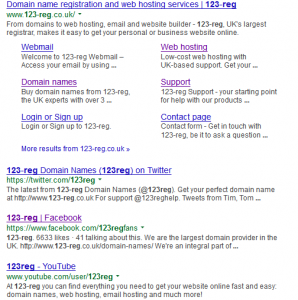SEO:The Basics – Using social channels to improve rankings
The rules of search have changed dramatically since the explosion of social media. Social channels such as Facebook, Twitter, LinkedIn and Google+ have become backlink central for influencing organic search results. This means that you need to pay closer attention to how social media affects search and how it can change the rules of online visibility and brand engagement.
Now, more than ever before, you need to incorporate social media into your SEO strategy if you want to improve your rankings and get found online.
Google indexes social media content
If you’re using Facebook, Twitter, Google+ or some other social platforms to engage with your audience, you’ve probably also noticed that your social media pages are already included in the top search results.
For example, when I searched for 123-reg, our Facebook, Twitter and YouTube accounts appeared in the top 6 results!
Google pays attention to more than your brand name. It also looks at the keywords you use in your social media posts so make sure you always optimise your posts before sharing, as well as your page descriptions and your social URLs.
Here’s what you can do:
Make sure you have a complete and accurate “About” page on all your social media pages. This includes:
- Company name
- Description of company and products or services
- Physical address
- Phone number
- Website address as well as any other information you think your audience would find useful, such as business hours.
Fact: Social signals improve rankings
There are many studies that prove there is a high correlation between social media engagement and search engine rankings. Social signals have both a direct and indirect impact on organic search rankings.
Direct impact from:
- The number of fans or followers you have on Facebook or Twitter or the number of people that have you in their circles on Google+.
- The number of posts on social channels mentioning your brand or linking to your site.
Indirect impact from:
- Increased inbound links due to improved online visibility/brand awareness.
- More positive reviews (in Google Local , Yelp, etc.) due to happier customers.
- Lower bounce rate, higher time spent on site, and more visitors that come back to your site.
Basically, Google wants to ensure users see the most valuable and relevant content when they search online. So, your social media activity matters. If your posts are being liked, shared and linked to, that content can rank higher as Google considers it valuable and coming from a trustworthy source that people recommend.
Make use of social channels
The most important thing you need to keep in mind when it comes to social media is that it’s not about you; it’s about them, your customers. So, focus on them and what you can provide to help them be better at their jobs, run a successful business, fix a problem and so on. That means creating valuable and interesting content that they will find useful and will want to share with the world.
Social media is also about building a community of quality followers who will look up to you, who will appreciate your advice and share your content with their friends. So, instead of building a list of followers, focus on building a community of quality followers that are actually interested in your content, that will join the conversation and engage their friends as well. The more active your social media accounts, the better.
Google+ is more powerful than you think
You might’ve read about the impact of Google Plus post on rankings. Pages and posts shared on Google+ are crawled and indexed almost immediately and they also contribute to PageRank. So, if you’ve already set up a Google+ account for your business and are actively sharing valuable content, your page is very likely to show up prominently in search results.
Here’s what you can do to benefit from Google+:
- Fill out your profile with relevant and accurate information;
- Build relationships by following other people, commenting on their posts and, of course, sharing great content that’s informative and interesting;
- Optimise your posts with relevant keywords to make it easier for people to find your content;
- Link to all relevant profiles from your Google+ About page including your site and others that you might be contributing content to.
In conclusion
Social media needs to be part of your SEO strategy and now, more than ever, you need to pay closer attention to how it impacts your rankings and brand awareness.
The best ways to use your social media channels to improve your rankings are to:
- Create a complete profile with accurate information and optimise it for search
- Optimise every post you share using relevant keywords
- Share your content across various channels
- Try your hardest to build a strong community of quality fans that enjoy engaging with you and sharing your posts.
Your turn now: how are you using social channels to improve your rankings? I’d love to hear from you so share your thoughts and tips in a comment below.

